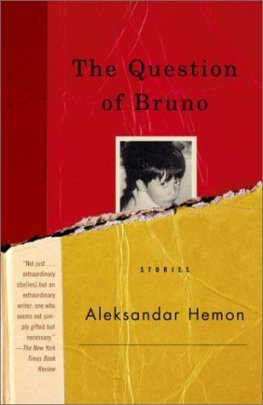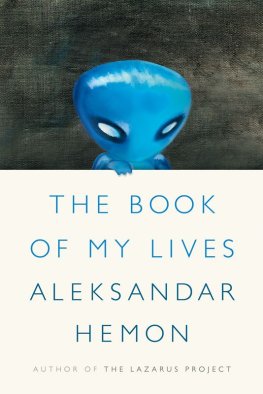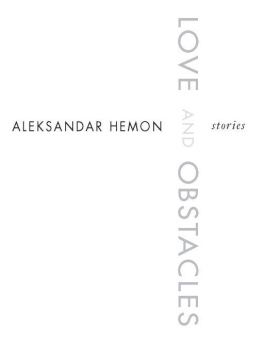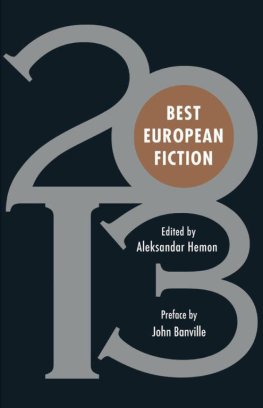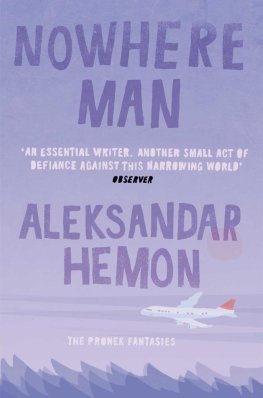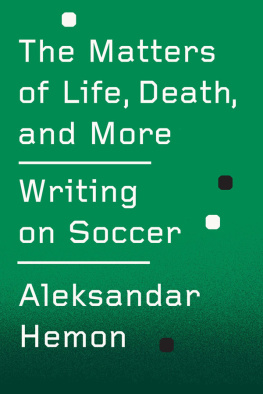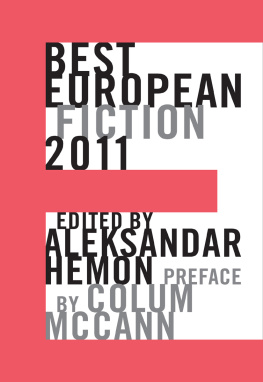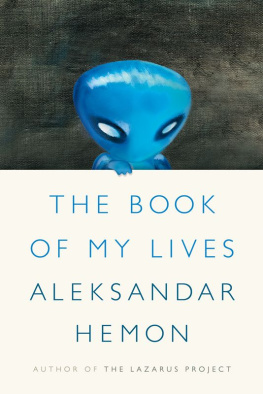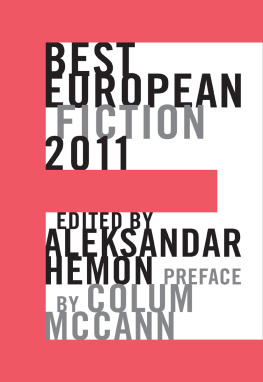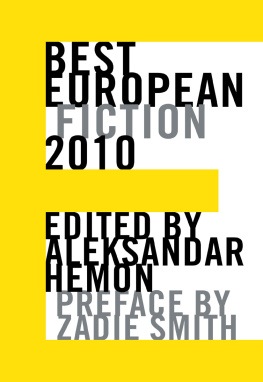Aleksandar Hemon
The Question of Bruno
We got up at dawn, ignored the yolky sun, loaded our navy-blue Austin with suitcases and then drove straight to the coast, stopping only on the verge of Sarajevo, so I could pee. I sang communist songs the entire journey: songs about mournful mothers looking through graves for their dead sons; songs about the revolution, steaming and steely, like a locomotive; songs about striking miners burying their dead comrades. By the time we got to the coast, I had almost lost my voice.
2We waited for the ship on a long stone pier, which burnt the soles of my feet, as soon as I took off my sandals. The air was sweltering, saturated with sea-ozone, exhaustion, and the smell of coconut sunscreen, coming from the German tourists, already red and shellacked, lined up for a photo at the end of the pier. We saw the thin stocking of smoke on the horizon-thread, then the ship itself, getting bigger, slightly slanted sideways, like a childs drawing. I had on a round straw hat with all the seven dwarves painted on it. It threw a short, dappled shadow over my face. I had to raise my head to look at the grown-ups. Otherwise, I would look at their gnarled knees, the spreading sweat stains on their shirts and sagging wrinkles of fat on their thighs. One of the Germans, an old, bony man, got down on his knees and puked over the pier edge. The vomit hit the surface and then dispersed in different directions, like children running away to hide from the seeker. Under the wave-throbbing, ochre and maroon, island of vomit, a school of aluminum fish gathered and nibbled it peevishly.
3The ship was decrepit, with pealing steel stairs and thin leaves of rust that could cut your fingers on the handrails. The staircase wound upward like a twisted towel. Welcome, said an unshaven man in a T-shirt picturing a boat with a smoke-snake, wobbling on the waves, and, above it, the sun with a U-smile and an umlaut of eyes. We sat on the upper deck and the ship leapt over humble waves, panting and belching. We passed a line of little islands, resembling car wrecks by the road, and I would ask my parents: Is this Mljet? and they would say: No. From behind one of the petrified islands, shaven by a wildfire, a gust of waylaying wind attacked us, snatched the straw hat off my head and tossed it into the sea. I watched the hat teetering away, my hair pressed against my skull, like a helmet, and I understood that I would never, ever see it again. I wished to go back in time and hold on to my hat before the surreptitious whirlwind hit me in the face. The ship sped away from the hat and the hat was transformed into a beige stain on the snot-green sea. I began crying and sobbed myself to sleep. When I woke up the ship was docked and the island was Mljet.
4Uncle Julius impressed a stern, moist kiss on my cheek the corner of his mouth touched the corner of my mouth, leaving a dot of spit above my lip. But his lips were soft, like slugs, as if there was nothing behind to support them. As we walked away from the pier, he told us that he forgot his teeth at home, and then, so as to prove that he was telling us the truth, he grinned at me, showing me his pink gums with cinnabar scars. He reeked of pine cologne, but a whiff redolent of rot and decay escaped his insides and penetrated the fragrant cloud. I hid my face in my mothers skirt. I heard his snorting chuckle. Can we please go back home! I cried.
5We walked up a dilapidated, sinuous road exuding heat. Uncle Juliuss sandals clattered in a tranquilizing rhythm and I felt sleepy. There was a dense verdureless thicket alongside the road. Uncle Julius told us that there used to be so many poisonous snakes on Mljet that people used to walk in tall rubber boots all the time, even at home, and snakebites were as common as mosquito bites. Everybody used to know how to slice off the bitten piece of flesh in a split second, before the venom could spread. Snakes killed chickens and dogs. Once, he said, a snake was attracted by the scent of milk, so it curled up on a sleeping baby. And then someone heard of the mongoose, how it kills snakes with joy, and they sent a man to Africa and he brought a brood of mongooses and they let them loose on the island. There were so many snakes that it was like a paradise for them. You could walk for miles and hear nothing but the hissing of snakes and the shrieks of mongooses and the bustle and rustle in the thicket. But then the mongooses killed all the snakes and bred so much that the island became too small for them. Chickens started disappearing, cats also. There were rumors of rabid mongooses and some even talked about monster mongooses that were the result of paradisiacal inbreeding. Now they were trying to figure out how to get rid of mongooses. So thats how it is, he said, its all one pest after another, like revolutions. Life is nothing if not a succession of evils, he said, and then stopped and took a pebble out of his left sandal. He showed the puny, gray pebble to us, as if holding irrefutable evidence that he was right.
6He opened the gate and we walked through a small, orderly garden with stout tomato stalks like sentries alongside the path. His wife (he pointed her out to us) stood in the courtyard, her face like a loaf of bread with a small tubby potato in the middle, arms akimbo, her calves full of bruises and blood vessels on the verge of bursting, ankles swollen. She was barefoot, her big toes were crooked, taking a sudden turn, as if backing away in disgust from each other. She enveloped my head with her palms, twisted my head upward and then put her mouth over my mouth, leaving a thick layer of warm saliva, which I hastily wiped off with my shoulder. Aunt Lyudmila was her name.
7I clambered, dragging a bag full of plastic beach toys, after my sprightly parents, up a concrete staircase on the side of the house, with sharp stair edges and pots of unconcerned flowers, like servants with candles, on the banister side.
8The room was fragrant with lavender, mosquito-spray poison, and clean, freshly ironed bed sheets. There was an aerial picture of a winding island (Mljet, it said in the lower right corner) and a picture of Comrade Tito, smiling, black-and-white, on the opposite wall. Below the window, the floor was dotted with mosquitoes with a large green-glittering fly or a bee, here and there still stricken by the surprise. When I moved toward them, the whisp caused by my motion made them ripple away from me, as if retreating, wary of another surprise.
9I lay on the bed, listening to the billowing-curtain flaps, looking at the picture of Mljet. There were two oblong lakes, touching each other, at the top end of the picture-island, and on one of those lakes there was another island.
10I woke up and the night was rife with the cicada hum, perpetual as if it were the hum of the island engine. They were all sitting outside, around the table underneath the shroud of vine twisting up the lattice. There was a long-necked carafe, full of black wine, in the center of the table, like an axis. Uncle Julius was talking and they all laughed. He would bulge his eyes, lean forward; he would thrust his fist forward, then open it and the hand would have the index-finger pointed at the space between my mother and his wife; and then the hand would retract back into the fist, but the finger would reappear, tapping its tip against the table, as if telegraphing a message. He would, then, stop talking and withdraw back into the starting position, and he would just watch them as they laughed.
11Uncle Julius spoke: We brought beekeeping to Bosnia. Before the Ukrainians came, the natives kept their bees in mud-and-straw hives and when they wanted the honey they would just kill them all with sulfur. My grandfather had fifty beehives three years after coming to Bosnia. Before he died, he was sick for a long time. And the day he died, he asked to be taken to the bees and they took him there. He sat by the hives for hours, and wept and wept, and wept out a sea of tears, and then they put him back into his bed and an hour later he died.

